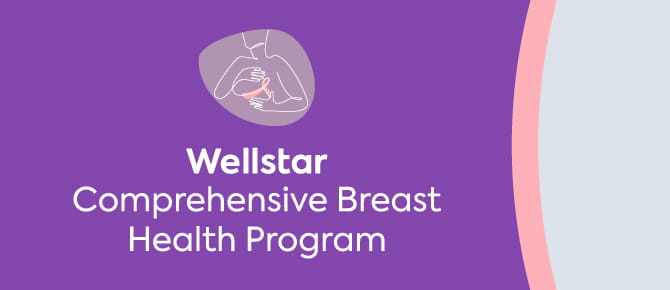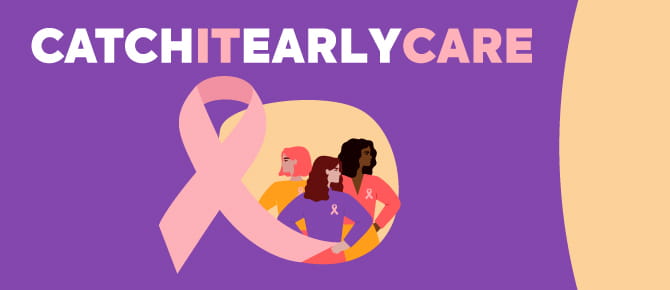
Wellstar Women's Health
Comprehensive Care for Every Life Stage
From adolescence to menopause and beyond, we offer advanced, specialty care tailored to your changing healthcare needs in every stage of life. We are committed to helping women live longer, healthier lives.
About
Women's Health at Wellstar
Wellstar women's health experts understand the conditions unique to women in all stages of life. Our comprehensive, compassionate team offers personalized care in a comfortable environment. We treat various health issues and life events, from gynecology and pregnancy to fertility and breast health. We also have extensive experience treating gynecologic cancers, as well as urogynecologic and other pelvic conditions.
Staying healthy is easier with convenient, state-of-the-art diagnostic, surgical and maternity services. Every woman should schedule an annual check-up at least once a year. As part of your well-woman exam, your provider will take your blood pressure, perform a Pap smear, pelvic exam and a breast exam. Depending on your age and medical history, your physician may recommend additional testing to catch potential health issues early.
Our Care Philosophy
Wellstar Women's Health understands that every woman is unique, and we know how to empower you to achieve optimal health. We are committed to caring for you with compassion and expertise.
Fertility
Deciding to have a family is a personal decision with many options. Based on your health, our team will help you achieve your goals and craft a plan tailored for you.
Obstetrics
Whether you need routine prenatal and delivery services or high-risk pregnancy care, we're here to ensure the health and wellness of you and your baby.
Gynecology
Healthcare needs change as you age. Get the most effective care for everything, from puberty and sexual health through menopause and hot flashes.
Breast Health
We use the latest screening technologies to monitor your breast health, which can help doctors diagnose abnormalities or breast cancers at the earliest stage.
Our Care Team
Our team partners with you to ensure you receive the comprehensive care you need and the experience you desire. For our expecting patients, we offer a variety of birth and care plans. Our gynecological team provides integrated care with other medical specialties, both medical and surgical, to determine the best possible treatment plan for you. Our team members collaborate with experts in other medical disciplines throughout Wellstar to provide you with personalized care tailored to your needs.
Comprehensive, specialized care
Medical specialists collaborate to create patient-centered care plans. Our multidisciplinary teams often include board-certified OB/Gyn’s and certified nurse-midwives who have the most advanced training and knowledge in their fields. They collaborate with specialists, including:
- Breast Surgeons
- Gyn-oncologists
- Maternal-fetal medicine specialists
- Reproductive endocrinologists
- Urogynecologists
Innovative technology, individualized treatment
You will experience the convenience and commitment of a dedicated team providing the highest quality care. We will develop a plan that is specific to you based on your needs and goals. Team members may include:
- Advanced nurse practitioners
- Genetic counselors
- Lactation and breastfeeding specialists
- Physical therapists
- Specialized imaging technicians
- Ultrasound professionals
Wellstar Foundation
As a not-for-profit, gifts to the Wellstar Foundation make it possible to provide patients with additional resources and amenities for a higher level of comfort and care. Every dollar donated supports Wellstar’s vision of delivering world-class healthcare, carried out through patient-centered programs, advancements in technology and making reliable healthcare available close to home. Your generosity also makes it possible to provide free screenings and diagnostic services to uninsured and underinsured patients every year. For more information about how to support our fight against disease, visit the Wellstar Foundation.

Helpful Links
Services
- Gynecology
- Urogynecology
- Gynecologic Oncology
- Preventative Care and Contraception
- Minimally Invasive Gynecologic Surgery
- Robotic Gynecologic Surgery
- Pelvic Floor Physical Therapy
- Menopause care
- Comprehensive Breast Health Program
- 3D Mammography
- Digital Mammography
- Breast MRI
- Breast Biopsy
- Breast Surgery
- Breast Reconstruction
- Early Detection
- Genetic Counseling


Wellstar Cobb Celebrates Opening of Obstetric Emergency Department
Wellstar Cobb Medical Center hosted a ribbon-cutting ceremony to celebrate the opening of its Obstetric Emergency Department, offering 24/7 specialized care for pregnant and postpartum patients.
Learn more
How Food Can Help With Hot Flashes
Nutrition plays a key role—and certain foods can influence how often perimenopause and menopause symptoms happen.
Learn more
Understanding Breast Cancer—And All Its Acronyms
By Dr. Nevin Wadehra, hematologist/oncologist with Wellstar and Northwest Georgia Oncology Centers
Learn more
Think PINK: Raise Your
Breast Cancer IQ
Wellstar oncologist and breast cancer specialist
Dr. Laura Pearson shares tips to help increase
breast cancer awareness throughout the year.

Breaking the News
Choose who to tell—and when—after a breast cancer diagnosis. The process of sharing your cancer journey takes courage, but self-compassion is key.
Learn more
Let’s Talk About
Mom’s Mental Health
Maternal mental health means how a mother feels in her mind and heart during pregnancy and after giving birth. It’s very important that moms—and the people around them—know the signs of a mental health concern.
Learn more
6 Weight Loss Questions Answered by Our Experts
People who want to lose weight have more options than ever before, though deciding which one to pursue can be a challenge. Read what two physicians have to share.
Learn more
4 Questions About Gynecologic Cancer
The gynecologic oncologists at Wellstar care for women at all stages of life, treating a variety of conditions with compassion and offering advanced care options.
Learn more
8 Heart Health Facts for Moms-to-be
Being proactive about heart health can help prevent life-threatening problems for pregnant women.
Learn more
Take the Mystery Out of Menopause
At Wellstar, our compassionate women’s health team provides individualized care to help women navigate this stage of life.
Learn more
Wellstar & Gabbi Partner to Assess Cancer Risk
We’ve partnered with Gabbi to provide breast cancer risk assessments for women ages 24 to 39.
Learn more
Navigate Your Breast Care with Concierge Services
Our program supports you with a full team of experts dedicated to your breast health care.
Learn more
The Importance of Regular Mammograms
Wellstar uses state-of-the-art imaging technology to help identify cancer sooner, so we can treat it faster. Getting a screening mammogram can save your life, so don’t delay.
Learn more
A Candid Talk About Your Breasts
A panel of women’s health experts discuss the latest on breast self-exams, breast cancer screenings and what you should be doing to be your healthiest.
Get the scoopLocations
Suite 220
Marietta, GA 30060
Suite 260
Hiram, GA 30141
Suite 150
Woodstock, GA 30189
Suite G
Alpharetta, GA 30004
Suite 200
LaGrange, GA 30240
Suite 100
Lithia Springs, GA 30122
Suite 9A
Austell, GA 30106
Suite 206
Marietta, GA 30062
Suite 301
Acworth, GA 30101
Suite 304
Holly Springs, GA 30114
Suite 300
Marietta, GA 30060
Suite 500
Marietta, GA 30060
Suite A210
Douglasville, GA 30134
Suite 1320
Acworth, GA 30101
Suite 420
Marietta, GA 30060
Suite 1400
Hiram, GA 30141
Suite 200
Austell, GA 30106
Suite 420
Marietta, GA 30060
LaGrange, GA 30240
LaGrange, GA 30240
Suite 115
Powder Springs, GA 30127
Building 2
Smyrna, GA 30082
Smyrna, GA 30082
Marietta, GA 30062
Suite 105
Marietta, GA 30066
Suite 110
Alpharetta, GA 30022
Hogansville, GA 30230
Suite 100
Acworth, GA 30101
Suite 105
Marietta, GA 30062
Norcross, GA 30071
West Point, GA 31833
Suite 120
Kennesaw, GA 30152
Smyrna, GA 30082
Suite 8A
Austell, GA 30106
Suite 105
Austell, GA 30106
Suite 400
Alpharetta, GA 30004
Marietta, GA 30060
Suite 115
Atlanta, GA 30341
Suite E
Alpharetta, GA 30009
Smyrna, GA 30082
Suite 216
Marietta, GA 30062
Atlanta, GA 30319
Decatur, GA 30034
Suite B
Douglasville, GA 30134
Suite 704
LaGrange, GA 30240
Suite B
Douglasville, GA 30134
Building B
Austell, GA 30106
Suite C
Woodstock, GA 30189
Suite E
Woodstock, GA 30189
Suite 303
Douglasville, GA 30135
Suite 400
LaGrange, GA 30240
Medical Office Building 2nd Floor
Augusta, GA 30912
Medical Office Building 5th Floor
Augusta, GA 30912
Augusta, GA 30909
Cancer Center 1st Floor
Augusta, GA 30912
Medical Office Building 5th Floor
Augusta, GA 30912
Augusta, GA 30904
Wellstar Kennestone Women's Health Clinic
Suite 420
Marietta, GA 30060
Wellstar Hospitalist Group OB/GYN
Medical Office Building 2nd Floor
Augusta, GA 30912
Wellstar Gynecologic Oncology
Cancer Center 1st Floor
Augusta, GA 30912
Wellstar Maternal Fetal Medicine
Medical Office Building 5th Floor
Augusta, GA 30912
News
Related Articles

Highlights
Turn Down the Heat: How Food Can Help With Hot Flashes
Helpful foods
A balanced, plant-rich plate can support your body’s natural regulation and may ease symptoms. “Soy is a phytoestrogen that mimics estrogen in our bodies and helps to reduce hot flashes,” Hulon said. “Foods high in antioxidants and omega-3 fatty acids, such as seafood and green leafy vegetables, are also beneficial.” Options include:- Mediterranean-style eating: plant-based foods, healthy fats
- Soy-based foods: tofu, edamame, soy milk, tempeh
- Phytoestrogen-rich foods: whole grains, seeds, legumes, berries
- Omega-3: salmon, chia seeds, avocados, flaxseeds
- Naturally cooling foods: apples, bananas, carrots, cucumbers, watermelon, pears, romaine lettuce
Foods to limit or avoid
Certain foods and drinks can trigger or worsen hot flashes, including:- Caffeine: coffee, energy drinks
- Ultra-processed foods: baked goods, sugary drinks, fast food, fried foods
- Alcohol: wine (especially red wine), beer, liquor
- Spicy foods: hot peppers, jalapeños, cayenne pepper, hot sauces
- Nicotine: cigarettes, vaping, smokeless tobacco
Supporting your well-being
Choosing nourishing foods, staying hydrated and noticing your personal triggers can help your body feel more balanced and comfortable. Nutrition matters, but it is only one part of your overall health. “Lifestyle changes include smoking cessation, decreased alcohol consumption, exercise, dietary changes and weight loss,” Hulon said. “Decrease inflammation by eating a rainbow of fruits and vegetables, increasing sleep to seven to nine hours per night and reducing stress. Despite good lifestyle modifications, many women may still need menopause hormone therapy support.” Wellstar offers resources to guide women through this transition. “At Wellstar, refer to the Center for Best Health, where practitioners are trained in helping patients achieve healthy goals and offer behavioral, exercise and nutrition counseling,” Hulon advised. “Additionally, a certified menopause practitioner can help patients navigate menopause hormone therapy.” Our women’s health experts are here to support you with guidance, compassion and whole-person care. To learn more about menopause care at Wellstar, visit wellstar.org/menopause.
Highlights
Make Health Your Habit
The start of a new year is a great time to focus on your health. For many of us, that means setting resolutions to live a healthy, full life. While many people like to reset their health goals in January, Wellstar partners with patients year-round to help them feel their best.
By following tips from Wellstar health experts, you can create realistic resolutions and better your health—making healthy choices a lifelong habit rather than a short-term goal.
Partner with your Wellstar care team
When it comes to your wellness goals, staying healthy starts with a visit to your Wellstar primary care team.
“Your primary care provider will collaborate with you to create a customized care plan and recommend screenings based on factors such as your age, gender and family history,” said Wellstar Primary Care Physician Dr. Cristina Dasoveanu. “Regular screenings can help you stay ahead of issues and catch any health concerns early.”
Know Your Foundational 4
To check your health status and screen for potential medical issues, your clinician will take your Foundational 4 numbers, a few screenings that identify risk factors for some health conditions such as heart disease.
Blood pressure
A blood pressure test helps diagnose hypertension (high blood pressure), hypotension (low blood pressure), heart disease and other conditions.
Blood glucose level
The amount of glucose (sugar) in your blood can indicate the onset of diabetes or risk of heart disease, heart attack or stroke.
Blood cholesterol
Low-density lipoprotein (LDL), often called “bad” cholesterol, can indicate clogged arteries, which may lead to heart disease, heart attack or stroke.
Body mass index (BMI)
A higher level of body fat may indicate an increased risk for heart disease, hypertension (high blood pressure) and diabetes.
Personalized OB/GYN care for women
“Gynecologists partner with women in their healthcare across the lifespan,” said Dr. LeThenia “Joy” Baker, a Wellstar obstetrician and gynecologist. “The first gynecologic visit is recommended between 13 and 15, and the first exam between 18 and 21.”
Gynecologists are uniquely positioned to care for women from adolescence through menopause and beyond.
“We’ll make sure you are up to date on screenings like mammograms and Pap smears, help you make informed decisions about family planning and fertility, and provide medical and surgical treatment for a variety of conditions affecting the female reproductive system,” Dr. Baker said.
Primary care, anywhere
Virtual care made easy with Wellstar Care Now
- Upper respiratory infections (cough, cold or flu-like symptoms, sinus, ear issues)
- Bladder infections or urinary tract infections
- Minor burns, bites and cuts
- Skin conditions
- STD testing, prevention, treatment and counseling
- Contraception and menstrual health
- Mental and emotional health (depression, anxiety and stress management)
- General questions and more
In an emergency, such as if you are having trouble breathing or experiencing chest pain, call 911.
Learn more about the different types of care Wellstar offers and where to go if you’re not feeling well.

Highlights
Understanding Breast Cancer—And All Its Acronyms
What does BRCA or HER2 mean when it comes to breast cancer?
To doctors, they’re important pieces of information that can guide their treatment strategies. To patients, they can mean the difference between one treatment plan and another—or even between risk and prevention.Understanding BRCA
The Definition: BRCA is short for “Breast Cancer Gene.” It includes two separate genes: BRCA1 and BRCA2. These genes have been found to impact a person’s chance of developing certain cancers. The Explanation: In the past few decades, breast cancer research has advanced from general diagnosis to highly personalized treatment. For example, BRCA1 and BRCA2 are associated with increased risk for several cancers including breast and ovarian cancer in women and prostate cancer in men. This is traditionally referred to as hereditary breast and ovarian cancer (HBOC) syndrome. However, there are other increased risks with BRCA, including prostate and pancreatic cancer. Patients without cancer but who have a family history of these cancers should discuss BRCA testing with their physician and consider evaluation by a genetic counselor. For patients with cancer who are known to have the BRCA gene, this could affect their treatment choices with more targeted therapy.Understanding HER2
The Definition: HER2 stands for Human Epidermal Growth Factor Receptor 2. It is a protein found on the surface of breast cancer cells and plays a role in how the cells grow and divide. The Explanation: Approximately 20% of female patients with breast cancer have tumors with high levels of HER2. Because HER2 is involved in the growth of cancer cells, this type of breast cancer can be aggressive. It's important that anyone diagnosed with breast cancer has their tumor tested for the presence of HER2. In the past, HER2-positive tumors were associated with an increased risk of both recurrence and death from breast cancer. However, with the use of chemotherapy and targeted treatment against HER2, the prognosis of HER2-positive breast cancer has improved substantially. Treatment options may include surgery, HER2-directed therapy with chemotherapy, endocrine therapy and radiation therapy. The best combination of treatments and the order in which to receive them can vary depending on the situation. Most patients with HER2-positive breast cancer will receive one or more chemotherapy drugs plus trastuzumab, a HER2 antibody. Many studies have shown that these treatments dramatically improve survival for patients with HER2-positive breast cancer. Trastuzumab and chemotherapy are even recommended for patients with very small, HER2-positive breast cancers. Tumors as small as 0.5 centimeters often warrant such treatment. Decisions must be individualized based on your unique risk. Talk to your doctor about whether you are a candidate for trastuzumab, especially if you have a small HER2-positive tumor.How do you determine what treatment is best?
There are many options for the treatment of breast cancer, and deciding which is best can be confusing. Expert guidelines help clarify what treatments are most appropriate for large groups of patients. However, individual factors—including your personal values and preferences, as well as your cancer stage and characteristics—are also important to consider. Talk to your care team about your treatment options and what is best suited to your individual needs. Learn more about breast cancer care at wellstar.org/breastcancer.We use cookies for booking and general analytics. Learn more about or internet privacy policy.
